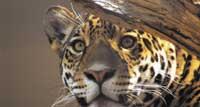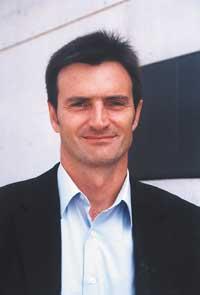"Documentaries about nature are telephones." Article of opinion
2003/05/01 Larrinaga Larrazabal, Asier Iturria: Elhuyar aldizkaria
We are convinced that information is power and we have turned data into a key to knowledge. We do not realize that the data is not enough guarantee of thought or opinion. If the data is not contextualized, we may be surprised, frightened, or simply scandalized.

When several documentaries are made, the only foundation is the spectator's emotion, sensationalism. Or it has. It seems that an hour-long production is well justified if the viewer surprises them, for example, saying they have found organic molecules in meteorites.
In fact, the discovery is of great magnitude. The first news was given in 1963. Kaplan, geochemist, fell in France in 1864 after analyzing the meteorite. 3.6 billion years earlier another meteorite fell from Mars. Discovered by NASA in Antarctica in the past decade, early research has provided material for many documentaries. NASA has detected polycyclic aromatic hydrocarbons in the Martético meteorite, as well as remains that look like mineral compounds that leave the remains of the activity of certain primitive microorganisms on Earth.
In the documentaries we comment on the presence of organic molecules in the Antarctic meteorite, with nuances and circumstances, and ask if in the excuse of this data there were some living on Mars. In search of answers, we are sent to explore the red planet at Mars Global Surveyor and other exciting missions, but removing some spectacular images give us little more. They leave us with the curiosity of before about the possible life of Mars and life in general.
In 1924 the biochemist Oparin launched a hypothesis on prebiotic processes, indicating that the first organic molecules were formed from simple inorganic molecules of carbon and nitrogen from the primitive terrestrial atmosphere. In 1952 Urey and Miller demonstrated in the laboratory the reactions Oparin had described. Currently, the presence of amino acids and nitrogenous bases in meteorites has allowed to check the prebiotic processes. That is, we can say that the first step to creating the life we know on this blue planet was not a miraculous or exceptional event, but the result of normal chemical reactions.
The problem is too dense for a documentary, but so far viewers would have made an entertaining journey, as the creation of life is a television show as exciting as the exploration of Mars. Faced with the space adventure, in addition, the process of access to the organic from inorganic matter offers us a context that helps us to understand our existence and science.
Dissemination, reflection of science
Science is knowing how to interrogate. If we ask questions with a concrete or unattainable answer, we will not tend to increase personal and human knowledge. Scientists need specific training to learn to question and interpret data, but that does not mean that science can only be understood by experts. The purpose of disclosure is to present and explain scientific methods and knowledge in a way accessible to all.

I have found little disclosure in nature documentaries and many unscientific thoughts, often by the scientists' mouths. "This insect has no interest for the human being, but it is here and as a manager of the planet we have to ensure its survival". The conservation chief of the island of Block thus concluded the documentary on the American scavenger beetle.
He is wrong with the place human beings occupy in nature, and instead of helping viewers discover who we are and where we are, he reaffirms the anthropocentric view of the world.
Anthropocentrism is to conceive man as the center of everything, and even interpret the world from human experiences and values, as they do in documentaries: the male of asbestos and the female "are formed forever"; the female of leopard "caresses the male with affection", once paired... After having attributed human emotions and behaviors, the moral sentence is almost spontaneous: "a precious cava is lazy, swim slowly and near the bottom". The leopard seal "has a thin and slender appearance that conceals its cruel character". Even recognizing that without a literary license the story of wildlife would be exhausting, it is not lawful to confuse viewers. Animals and plants are not people. They do not love, they do not die, they do not rejoice. Convinced that we all know this, anthropocentric vision has entered the brain marrow. If not, what does it mean that living beings compete to leave their genetic heritage in the next generation? Will it not be our window?
Finalist line
The vulgarizations of the theory of evolution are bad. By saying that living beings try to leave their genes in the next generation, no one will think that living beings know what they are, but many will understand that living beings are reasonable. Intelligent enough for nature to fulfill what it can entrust them. Saint Thomas Aquinas taught that every human being can boast of the mandates of natural morality, and it seems that he fell short, since in the imperative they have been established within all living beings. Some people have discovered in their inquiry that non-reproductive sex is reproachable, and nature has become Ararteko. In the documentaries yes: "Hippos are equated to be hippos." "The black widow leaves the tip of the stick in the female's germ as a mating plug to ensure that the next generation carries her genes."
But the truth is another. In reality, sexual relations occur intuitively in nature and are only rationalized by man, as it rationalizes food or sleep. The black widow is not aware that new living beings will be created after leaving their sperm inside their female. You can hardly worry about your lineage.

When it comes to explaining the facts of nature, we have to change the way we speak so as not to convince anyone that human experiences and values are general, much less that it can be found in the very justification of those experiences and values. Thus, in addition to anthropocentrism, other erroneous interpretative keys will be avoided, first of all finalism. In fact, anthropocentric approach and finalist interpretation are often the rival and awakening of the same mentality. Those who have no knowledge or reason cannot be attributed any objective in their activity, but we are very comfortable to understand the facts in the light of an objective.
The documentaries focus on the most comfortable: the ancestors of cetaceans "disappeared hair and hind legs, internalized sexual organs and the body became aerodynamic to move better in the water". It is absurd to think that organic structures changed by themselves. It is no less absurd to think that the living beings themselves modified them with a goal. It's absurd, yes, and that's why this kind of phrase seems to me more than a way of speaking. They are truths of an intellectual fraud that is gaining strength.
Evolution
The theory of evolution was not formulated by Darwin. Darwin explained the mechanism of evolution: natural selection. Natural selection is a separation inherent in nature, by which only the characters of successful reproductive individuals remain. Differentiation requires variants.
Darwin did not know how characters are transmitted or how variants appear. In the absence of a satisfactory theory of inheritance, lamarckism was breathed in the 19th century. At the end of the 20th century, although scientists had already discarded it, after several trials.
Lamarck's theory, as opposed to Darwin's, was aligned with human expectations: all organisms have a kind of inner courage that pushes them to a greater complexity of their instincts. When changes occur in the environment, the internal momentum gives rise to adaptations that respond to the needs of the new medium, although they do not lead the organism to greater complexity. Adaptations are also preserved by descendants, that is, the characters obtained are heritable. Genetics has totally belied that, but Lamarck's theory has not gone off. For many there has come a time when science and other interests have not been able to unite in the progress of knowledge, and it seems that at the crossing they have preferred to resort to random rebellion. Some have addressed consolable creationism, but others have responded to science with the intellectual fraud mentioned: the theory of internal capacity.

When there is the inner thrust, they do not have to deny evolution. They tell us that evolution is a straight line, a thousand times branched, but tenacious to reach the human being and that it reached the human being. Lamarck said nothing like it and was a real scientist. However, these timers are trying to beat science with their own weapons using pseudo-mathematical arguments: being the probability of reaching the human being in an evolution of hundreds of thousands of years and hundreds of thousands of steps less than 1/1030, that is, being insignificant, could never have happened, had it not been programmed or corrected. The argument is, of course, false, because it makes no sense to talk about the probability of it happening.
Once again, unfortunately, the best documentary language is the best means for unscientific thinking. Writers, far from warning of fraud, extend it to the four winds: The Paws monkeys "present a higher risk of predators on the surface and can see at least further the pillars. We may have risen ourselves for the same reason." Livers "hang from the branches for a long time, so they have a more straight and vertical position than most monkeys. [...] Wouldn't this be an important stage on the road that would eventually lead us to walk standing on two feet?».
These kinds of ideas are trash. Most nature documentaries make us a corrupt interpretation of nature and are sensationalist. They do not inform or educate us. What are nature documentaries if they are not telephones?

Gai honi buruzko eduki gehiago
Elhuyarrek garatutako teknologia




